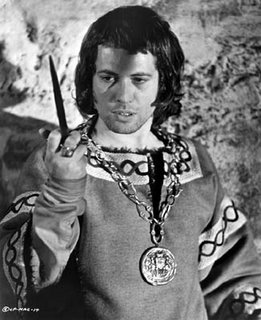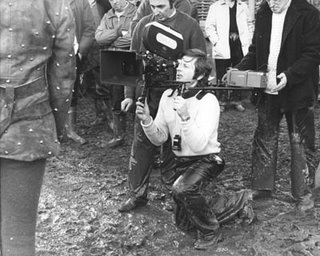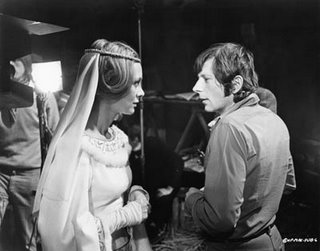------------------------------------------------

By the pricking of my thumbs,
Something wicked this way comes.
During the 25 years that followed the first movie adaptation of a William Shakespeare play which was both a critical and popular success, Laurence Olivier's Henry V (released in 1944), it was primarily he and Orson Welles who, if and when they were able to obtain the funds, brought Shakespeare adaptations to the big screen. Welles was able to film a version of Macbeth. Olivier unfortunately was not. Prior to 1971 and in the opinion of many another to this day the most successful movie adaptation of that tragedy is Akira Kurosawa's adaptation of his favorite among Shakespeare's plays, Throne of Blood
(released in Japan in 1957).

Like Kurosawa and no doubt a great many others, Macbeth is my favorite Shakespeare play. In large part this is due to Macbeth being, as Harold Bloom puts it, "an uncanny unity of setting, plot, and characters fused together beyond comparison with any other play of Shakespeare's." I've always wondered, since learning that in all probability Macbeth was written after Hamlet, if Macbeth isn't an answer ("Yes, I can do that, too") to critics of the earlier play. For all its magnificence and length, there are a number of things in Hamlet which make no sense (see Tom Stoppard's Rosencrantz & Guildenstern Are Dead) and my guess is that Shakespeare heard about them a lot at the time. Such are the unknowables with which I sometimes become obsessed.
Because of that unity and relative shortness (it is the shortest of the tragedies) one might think that Macbeth, should the cash to do so be available, would be popular as adaptation source material. The fact that it has a reputation as being the unlucky play may be a reason that until recently (?) it was not. In 1971, a major director who occasionally acts and who has been very unlucky (or cursed), with the financial backing of Hugh Hefner, created the film adaptation that, while by no means definitive, is a realization of Shakespeare's play. This effort is in my view as yet without equal among such filmed adaptations as do exist.

Things without all remedy
Should be without regard: what's done is done.
Roman Polanski had directed Knife in the Water, Repulsion, Cul-de-Sac, The Fearless Vampire Killers and Rosemary's Baby when, while he was working on screenplay ideas and screwing around in London, his pregnant wife and everyone else at their home in the Hollywood Hills were slaughtered on August 8, 1969. In the months that followed that horrifying event, while Polanski coped in California and the murderers were unknown, the press speculated freely as to whether or not Polanski's previous work might not have had something to do with what had happened. When the murderers were caught and it turned out they had no clue or care regarding who had been in that house, Polanski picked himself up and went back to London where, at some point, he decided to adapt Shakespeare's contemplation (with character) on the horrors associated with murder and, with theater director and critic Kenneth Tynan as his collaborator, adapted and then filmed a version of Macbeth.
Was the resulting movie in any way a response to the murders and to the press coverage while the murderers were unknown? Polanski biographies suggest that, if anything, the graphic violence and the plot changes that make it an almost wholly unflattering portrait of the human character were in some sense aimed at the press. With regard to the murders, they say, he had already moved on.

Lay on, Macduff,
And damned be him that first cries, "Hold, enough!"
The movie begins with red sky at morning on a beach. The witches (real women here) do their thing and as they move away from the camera the fog comes in and under the credits there are the sounds of battle. When the credits are done, the fog clears, and we find ourselves on the same beach watching the living among the vanquished be, on camera, made dead. It ends, two hours and some minutes later, with a dark and more historically accurate ending than that with which the play concludes.
Between times, relatively young, though not all that inexperienced, actors play the roles. The lines assigned have been fairly uniformly reduced to dialogue that makes for more natural-sounding speech within the context of the plot. The soliloquies, such as they are, are done mostly in voiceover. Minor characters like Ross, Seyton and Donalbain are seen to do more, if not to be heard more, and the good in some of the characters is altogether dispensed with.
We still watch in rapt fascination as the warrior turned murderer of both benefactor and friend--because of an ambition fortified by an accurate prediction regarding his future, and the timely remonstrance and clarity-in-thinking of his helpmate--has his character gradually disintegrate--until a killing machine alone remains. His helpmate meanwhile goes "blood simple"--to borrow from Dashiell Hammett--and commits suicide. The aftermath, beyond provoking the most famous of all the soliloquies, results in nothing more than a tarp being thrown over the twisted corpse, which remains where it falls throughout the remainder of the action.

This is not a movie for the squeamish. It is not quite true that all the murders which take place on and off stage in the play take place on camera in the movie. The wounds, at least, are sometimes delivered off camera. There is nudity where there need not have been, but then this was released in 1971, and there had by then been one extremely successful post-code Shakespeare adaptation, Romeo and Juliet, so the nudity is not so surprising. It appears that Playboy's participation had nothing to do with any content decision. The lead actors, as ever seems to be the case*, do not give astonishing performances, though as with all Polanski movies they give the performances he wanted them to give.
It all plays out in Technicolor in widescreen on a DVD which, like the video version, has a picture of Banquo on the cover and little of interest besides the movie on the disc.
*The first stage production I saw featured Charlton Heston as Macbeth and Vanessa Redgrave as Lady Macbeth. It played to mixed reviews. I loved it.
2 comments:
I second David. These mini-reviews are really good.
Thanks. I'm going to try to provide MHA with one a week. Most will be reviews of older movies I like.
Best.
Post a Comment